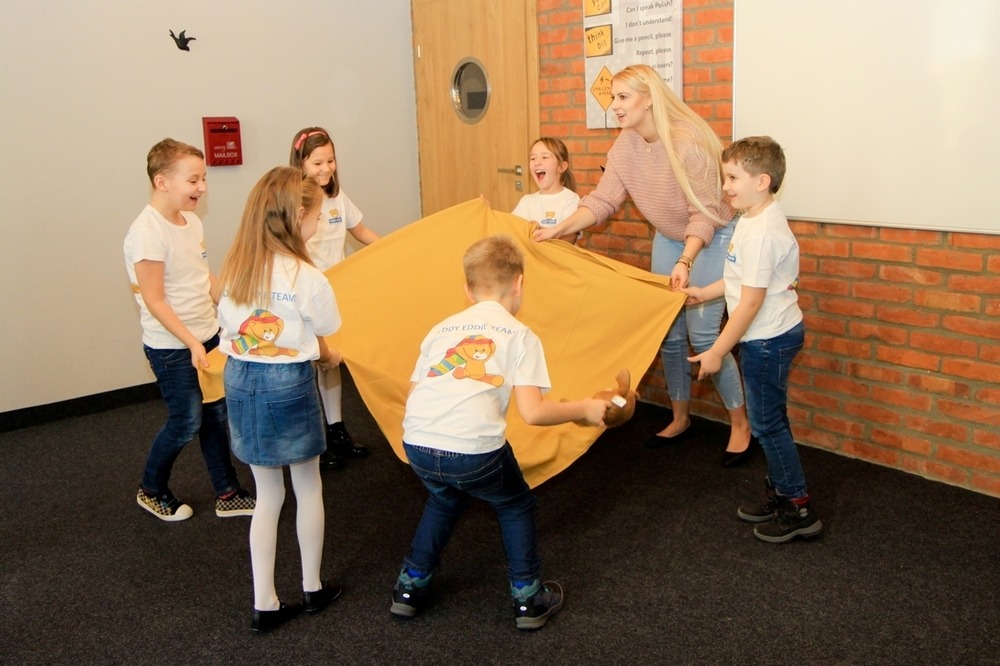- Seize the joy
Surely you know the aphorism carpe diem – seize the day, seize the moment. It is a guiding light for people who want to live their lives to the fullest. What about a maxim for those who dream of accompanying children on their journey of harmonious development and creative potential? In my opinion it should be this rule: enjoy the moment, seize it, but do not forget about joy! Why is that? Because joy is an integral part of a child’s complete development – and that includes language.
- Emotions, fun and affection
The reason for this is quite simple. We, the adults, so serious and stable, perceive the world very rationally, associating it with specific concepts and words. Do our children see it the same way? Even people with little insight can understand that not all living beings perceive reality in the same way. Take a dog as an example: its brain decodes the world through its sense of smell. A bat’s brain uses sound waves for echolocation, and the bees… they register electromagnetic impulses – just a bit of interesting trivia J. And what about children…? They also perceive the world differently than adults, especially during the early years of their lives. This is the time when classes with mischievous Teddy Eddie begin. But what does that word differently mean? For children, the world comes down to these three things: emotions, fun and affection.
In this context fun is the key for stimulating intellectual and emotional development. We can say that a child’s brain is so constructed that the best way to learn is through playing. When we play with children, they naturally enter the learning mode, and their senses focus on this particular form of activity.
Did you know that this is the moment when the child’s brain is at its most effective? It can easily concentrate on a given task, on your gestures and words, and what is more, the memory works much better than when the child is given instructions or orders.
- Language games with Teddy Eddie
Have you noticed the benefits of play in the Teddy Eddie method yet? Next time you come to pick up your child and you hear a cheerful bustle coming from the classroom – don’t worry! Something very important is happening in there – your child is learning English in the most natural way possible: through play. Playing can spark positive emotions, but it also encourages role-playing in a safe space. This in turn allows children to put themselves into someone else’s shoes and think about the future. Children who play using English (among other things) show a higher level of intelligence and maturity than that which is typical for their age. This is because playing broadens the cognitive capabilities of their minds more than any other type of activity.
- A magic carpet ride
If you want to enter the world of children and see it from their unique perspective, then you should follow in the steps of the Teddy Eddie teachers: get down on the carpet and look at everything from this level. There is no better way to get children’s attention, and that is why carpets (not only the magical flying types) are an integral part of Eddie’s classes. No child can remain indifferent towards an adult who decides to go through the magic gate and enter their world. This is the reason why we always sit on the carpet with our pupils and use play as a tool for language education. The teachers who sit on the carpet are given a great privilege, as well as a good observation point – it gives them a close look at their little students’ brain development in the context of learning English and enables them to participate in it.
- Controlled noise puts reality in order
We need to remember that noise does not always equal chaos. Controlled noise – the sort that stems from emotional well-being and good fun – guarantees that your child is learning English in an effective, brain-friendly way. What is more, creative noise, made up of laughter and positive energy can organise the space of language classes and introduce a didactic order – just not the kind we know from the old 19th century schoolrooms, where severe discipline and absolute silence were the rule for education – order that is good for the brain and for the acquisition of knowledge.
Let’s sit down on the carpet today, and together with our children prepare to seize the joy – carpe gaudium!
_______________________________________________________________________________________________
The author of this article is Dominika Muńko – a philosopher, neurocognitive scientist, English teacher, methodologist totally fascinated with cognitive capabilities of the brain; founder of a language school and author of licensed and award-winning programs in the field of speed reading, memory techniques, attention and effective learning – Memo (more: www.szkolamemo.pl); active member of international research teams, among others in Foggi, Modena, New York and Kelaniji.
Learn more about the Teddy Eddie method HERE
Visit our local websites: Teddy Eddie CZ and Teddy Eddie SK

